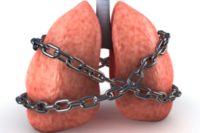
|

|
|
|
|
That antibacterial hand soap you use in your kitchen or bathroom contains a chemical that may affect how well your hands function.
Triclosan, an antibacterial chemical widely used in hand soaps and other personal-care products, hinders muscle contractions at a cellular level, slows swimming in fish and reduces muscular strength in mice, according to researchers at the University of California, Davis, and the University of Colorado. The findings appear online in the Proceedings of the National Academy of Sciences of the United States of America.
A health and environmental concern
"Triclosan is found in virtually everyone's home and is pervasive in the environment," said Isaac Pessah, professor and chair of the Department of Molecular Biosciences in the UC Davis School of Veterinary Medicine and principal investigator of the study. "These findings provide strong evidence that the chemical is of concern to both human and environmental health."
In addition to soap, triclosan is found in deodorants, mouthwashes, toothpaste, bedding, clothes, carpets, toys and trash bags. The EPA in 1998 estimated that more than 1 million pounds of triclosan are produced annually in the United States, and that the chemical is detectable in waterways and aquatic organisms ranging from algae to fish to dolphins, as well as in human urine, blood and breast milk.
In both test tube and animal experiments, triclosan impaired the ability of isolated heart muscle cells and skeletal muscle fibers to contract.
Not regulated as a drug
"The effects of triclosan on cardiac function were really dramatic," said Nipavan Chiamvimonvat, professor of cardiovascular medicine at UC Davis and a study co-author. "Although triclosan is not regulated as a drug, this compound acts like a potent cardiac depressant in our models."
Chiamvimonvat cautioned that translating results from animal models to humans is a large step and would require further study. However, the fact that the effects were so striking in several animal models under different experimental conditions provides strong evidence that triclosan could have effects on animal and human health at current levels of exposure.
